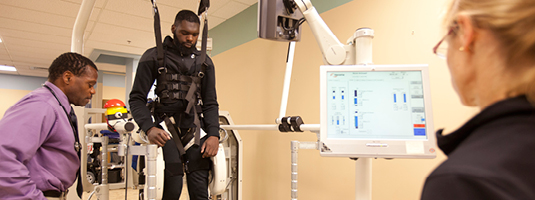Multiple Sclerosis (MS) Rehabilitation

Multiple sclerosis (MS) is a neurological degenerative disorder that involves nerve damage and inflammation within a person's central nervous system. People diagnosed with MS may face a number of challenges, with some of the most common being:
- Numbness
- Memory and concentration problems
- Balance issues
- Movement and mobility limitations
- Blurred vision
- Slurred speech
- Tremors
Integrating Therapy Into The MS Treatment Plan
While the majority of patients diagnosed with MS remain mobile and functional, medication combined with rehabilitation and ongoing therapy is generally very useful and has the potential to increase a person's quality of life. At the University of Maryland Rehabilitation Network, treatment plans are developed with consideration for the specific type of MS the patient has been diagnosed with: Clinically Isolated Syndrome, Relapsing/Remitting, Primary Progressive or Secondary Progressive.
When integrated into a patient's overall treatment plan, therapy is a tool that can minimize symptoms and the risk for complications, and maximize functionality, both short and long-term. MS patients turn to the University of Maryland Rehabilitation Network for rehabilitation support and care because:
- Our neurologists and outpatient therapists are specially-trained in caring for individuals with MS and are considered experts in therapeutic approaches to help support management of the disease.
- We offer the knowledge and experience necessary to accurately evaluate a patient's potential and then develop a truly customized rehabilitation plan centered around their goals.
- The latest rehabilitation technology and a comprehensive network of resources are available to help our patients maximize functionality and independence.
Technology And Assistive Devices To Make Moving Easier
The UM Rehabilitation Network has made significant investments in assistive technology to maximize treatment options for MS patients. Patients have access to:
- Body weight support treadmills – treadmill training that uses a harness to support a person's body weight to help improve walking
- Muscle stimulation equipment – devices that send electrical pulses to safely cause muscles to contract which can improve walking or hand function
- MIT-Manus – robot-assisted therapy used to improve a person's upper body motor function
- Vector Gait & Safety System – robotic trolley system which supports a person's body weight to help a patient practice and increase mobility
- Dynavision – wearable sensor technology to improve a person's gait and balance
Collectively, these technologies help MS patients strengthen, tone and retrain muscles, or recover from injuries. Our team also offers a wealth of knowledge and insight for patients who require assistive walking devices. We can help patients with fittings and bracing, and can also help patients and their families make decisions about the types of assistive devices that are most ideal for everyday use.
